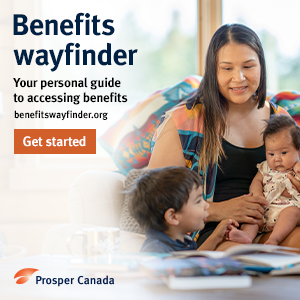Transition Magazine: Editorial (Spring 2024)

This editorial was written by Chantelle MacIsaac, Senior Manager of Interdepartmental and Strategic Initiatives at MOSAIC. It originally appeared in the edition of DABC’s Transition magazine, Welcome to BC: Challenges and Supports for Newcomers with Disabilities (Spring 2024).
Read the full edition in PDF format here and in text-only format here.
If you’re interested in contributing to Transition as an individual or an organization, please email transition@disabilityalliancebc.org.
__________________________________________________________________________________
Imagine being a newcomer to Canada. You need to navigate a new culture and new systems, with rules that are written and unwritten, spoken and unspoken–all through a second language.
Newcomers to Canada experience many varied challenges in the settlement process. The road to stable housing, employment and community inclusion can be a windy one, with frustrating detours along the way.
Then imagine also living with a disability. All these challenges are multiplied.
You will face a dizzying array of services, and complicated eligibility and application processes for government and community programs. Systemic ableism will create further roadblocks for you because services, policies and spaces are often designed without people with disabilities in mind, despite 1 in 4 Canadians having a disability.
Newcomers who are looking for information and support also find that immigration and disability services are often not available through the same organization. Immigrant services have not always had training in disability-aware services and disability services may not have the tools or capacity help newcomers settle safely in our communities.
A final and crucial piece of the settlement challenge for newcomers living with disability is mental health. Immigrants and refugees too often arrive in Canada having experienced trauma, such as social instability or violence, domestic violence or the perils of the journey to Canada itself. The ability to offer mental health supports and trauma-informed services is vital to truly meet the needs of these newcomers.
As a result of these intersectional barriers, newcomers with disabilities may find a closed door when they reach their destination here in BC and Canada.
Work Supporting Newcomers
In 2022, MOSAIC launched a program called the Accessibility for Newcomers Program to begin addressing some of these barriers.
With initial funding from the City of Vancouver and additional funding from Immigration, Refugees and Citizenship Canada (IRCC), MOSAIC has developed a circle of care approach where newcomers with disabilities complete a needs assessment with multilingual settlement workers and receive supported referrals to settlement, employment and disability services.
Participants are connected to multilingual programming within MOSAIC, such as WorkBC and employment services, violence prevention programs, legal advocacy pertaining to tax benefits, 2SLGBTQIA+ programming, seniors clubs and multilingual settlement workers.
Before making referrals to external services, staff first “knock on the door.” If no one answers, or when someone answers but doesn’t invite the client in, we support clients to navigate their way to another door. This approach facilitates successful connections to programs and services, and reduces frustration and isolation.
In addition to this program, MOSAIC led focus groups at a 2022 newcomers’ forum (please see Newcomers Speak Out at Forum on page 6). We also led a group at a 2023 forum on Mental Wellness for People with Disabilities, with the aim of amplifying the impact of people with lived experience on the services designed to support them.
The theme that emerged out of the Mental Wellness focus groups with newcomers with disabilities was the importance of community connection and belonging.
To meet this call, the Accessibility for Newcomers Program plans to enhance services in the coming year with regularly scheduled activities for newcomers with disabilities to come together, network, socialize and create community. Check out the program website for emerging opportunities to be a part of the community!
We are also jointly offering a new program in partnership with Disability Alliance BC (please see MOSAIC and DABC Partner to Support Newcomers on page 9) called the Newcomers with Disabilities project. With this program, we hope to build a service that not only better meets the needs of newcomers, but provides a model for intersectional community programs.
In This Transition
In this Transition, you’ll see more pieces of the big picture for newcomers. Race and Disability Canada talks about their work gathering the experiences of racialized people with disabilities, and their calls to action for education and training. You’ll learn more about the Newcomers with Disabilities forum and hear directly from newcomers about their settlement challenges. Plus, you’ll see more details about our newcomers partnership with DABC.
Last but not least, you’ll find out how to connect with some of the key groups offering information, support and resources to newcomers with disabilities.
Chantelle MacIsaac is the Senior Manager of Interdepartmental and Strategic Initiatives at MOSAIC, and oversees the Volunteer Program and Accessibility Services. Chantelle values and creates space for the voices of people who will utilize the services to be heard.
Accessibility for Newcomers Program Url: https://mosaicbc.org/our-programs/support-for-newcomers-with-disabilities/
 The Disability Tax Credit (DTC) is an important benefit that reduces taxes and provides access to important tax related benefits like the Child Disability Benefit, Canada Worker’s Benefit Disability Supplement, and financial programs like the Registered Disability Savings Plan, Canada Dental Care Plan (June 2024), and Canada Disability Benefit (2025).
The Disability Tax Credit (DTC) is an important benefit that reduces taxes and provides access to important tax related benefits like the Child Disability Benefit, Canada Worker’s Benefit Disability Supplement, and financial programs like the Registered Disability Savings Plan, Canada Dental Care Plan (June 2024), and Canada Disability Benefit (2025). 






